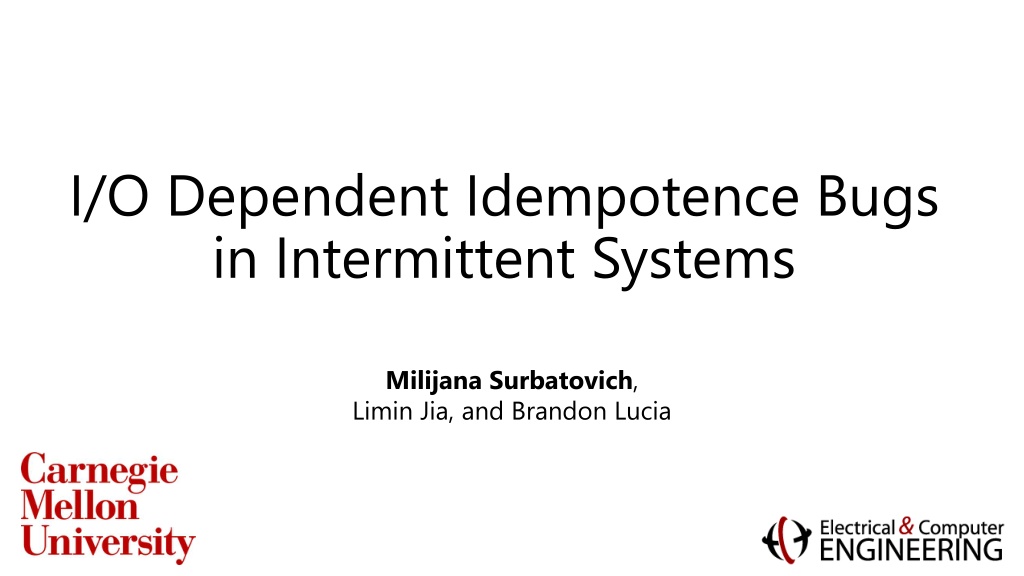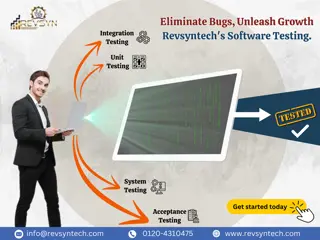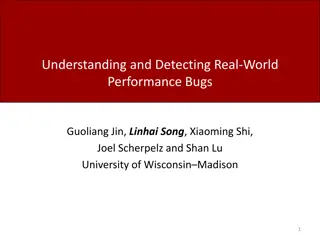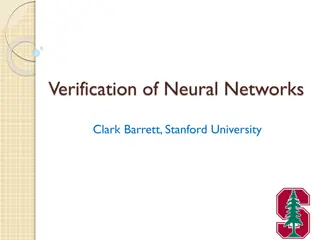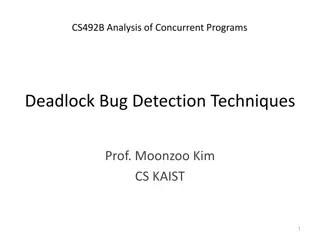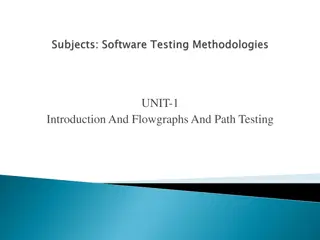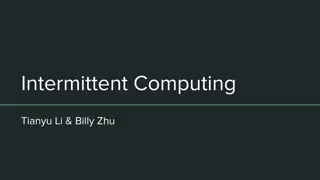Understanding Idempotence Bugs in Intermittent Systems
Energy-harvesting devices enable computing in inaccessible environments, but intermittent execution can lead to bugs and inconsistent updates. The impact of I/O-dependent idempotence bugs in intermittent systems is explored, highlighting the challenges and the need for tools like IBIS for bug detection. Repeated I/O operations can cause issues, especially with input operations, making bug detection and resolution crucial in these environments.
Download Presentation

Please find below an Image/Link to download the presentation.
The content on the website is provided AS IS for your information and personal use only. It may not be sold, licensed, or shared on other websites without obtaining consent from the author. Download presentation by click this link. If you encounter any issues during the download, it is possible that the publisher has removed the file from their server.
E N D
Presentation Transcript
I/O Dependent Idempotence Bugs in Intermittent Systems Milijana Surbatovich, Limin Jia, and Brandon Lucia 1
Energy-harvesting devices (EHDs) enable computing in inaccessible environments Batteries: expensive or impossible to access and replace maintenance can be intrusive 2
Intermittence in energy harvesting devices Harvester Hardware platform Energy Buffer Powers on as energy is available 3
Intermittence in energy harvesting devices Volatile state clears, persistent state remains Harvester Hardware platform Powers off at arbitrary program location Energy Buffer 4
Background: intermittent execution causes bugs B x := y Save volatile state periodically A Write-after-read: no dataflow A Re-execution causes dataflow y := 5 B B B x := y Need to back up original value Power fail Re-execution must be idempotent y := 5 C B Current systems provide forward progress and fix WAR bugs is this enough? 5
What about input operations? B x := input() y := x B A different value on re-execution? x := input() y := x 6
Current systems miss bugs caused by input Repeating input operations causes unaddressed bugs Want to port existing code-bases Prior systems only address progress and WAR bugs 7
Outline How intermittence causes bugs without system support Repeated I/O operations can cause idempotence bugs IBIS, a tool for detecting bugs caused by I/O operations Evaluation and conclusion 8
Repeated I/O reads cause idempotence bugs Control dependence on I/O causes inconsistent updates! input := get_temp() get_temp() -> cold input < limit steady := 1 1 steady 0 blink if (input < limit): steady := 1 else: blink := 1 0 Execution Time get_temp() -> hot input > limit blink := 1 assert == false steady 1 blink 0 1 assert(blink^steady) 9
Simple fix can break program timeliness get_temp() -> cold input < limit steady := 1 input := get_temp() Execution Time if (input < limit): steady := 1 else: blink := 1 (input == cold) input < limit steady := 1 assert(blink^steady) J. Hester, K. Storer, and J. Sorber. Timely Execution on Intermittently Powered Batteryless Sensors. (SenSys '17) 10
Detecting I/O bugs is particularly important for EHDs Sensor driven No simple fix Input causes bugs get_temp() -> cold get_temp() -> cold get_temp() -> hot We characterize input-dependent bugs for the first time 11
Outline How intermittence causes bugs without system support Repeated I/O operations can cause idempotence bugs IBIS, a tool for detecting bugs caused by I/O operations IBIS-Static less precise, full coverage, no runtime cost IBIS-Dynamic no false positives, may have less coverage, runtime cost Evaluation and conclusion 12
IBIS-S: static taint analysis and pattern matching Uses standard taint analysis Reports bug patterns to the programmer Bug Pattern Matching Taint Analysis Report 13
Taint analysis: tracks dataflow off inputs LLVM analysis pass, programmer annotates tainted source Algorithm input := get_temp() 1. Mark uses of annotated functions as tainted, add to worklist if (input < limit): Repeat until list is empty steady := 1 2. Get item from list, propagate taint to any uses else: blink := 1 3. If a branch is tainted, propagate taint to any dependent stores alert(blink) 14
Taint analysis: interprocedural flows input := get_temp() if (input < limit): Function arguments steady := 1 func sample: io_src = getTemp() process(io_src) else: blink := 1 func process(temp): sink = temp alert(blink) alert(val): Also: global variables, return statements, pass-by-ref parameters if (val): events++ 15
Bug pattern matching A tainted branch with paths that write to different variables Bug Pattern Safe Pattern if input < limit if input < limit s0: s0: s1: s1: blink = 1 steady =0 blink steady blink = 0 steady = 1 blink steady blink = 1 steady = 1 blink steady blink Pass outputs bug report of the tainted branch and differing variables to the programmer 16
Outline How intermittence causes bugs without system support Repeated I/O operations can cause idempotence bugs IBIS, a tool for detecting bugs caused by I/O operations IBIS-Static less precise, full coverage, no runtime cost IBIS-Dynamic no false positives, may have less coverage, runtime cost Evaluation and conclusion 17
IBIS-D: dynamic taint and freshness propagation Taint: input dependent? Fresh: written on the current execution? Implementation An execution must not read a stale, tainted value 1. Shadow memory to record metadata taint fresh x 0 1 2. Compiler pass to instrument calls to runtime library y := input y 0 1 0 1 z := y w := x z 0 1 0 1 w 0 0 Runtime warning 18
Outline How intermittence causes bugs without system support Repeated I/O operations can cause idempotence bugs IBIS, a tool for detecting bugs caused by I/O operations IBIS-Static less precise, full coverage, low overhead IBIS-Dynamic no false positives, may have less coverage, runtime cost Evaluation and conclusion 19
Goal of evaluation Does IBIS-S provide usable reports to the programmer? Reported Bugs False Positives Does IBIS-D have reasonable overheads? IBIS-D 20
Evaluation methodology for IBIS-S Embedded system drivers Manual categorization Software validation IBIS-S Existing intermittent apps 21
IBIS-S finds bugs with few false positives Bug report breakdown 6 Blank bar means no reports generated 5 4 3 2 1 0 mpu hdc bmp opt tmp wsn elink rfid prox gest hmc temp ar bc bfish cem ckoo rsa NoBug NoUse TrueBug Not I/O driven no bugs Sensor drivers more likely to have bugs 22
Evaluation methodology for IBIS-D Extract Bugs IBIS-D Embedded system drivers Compare runtimes IBIS-D Existing Compare runtimes intermittent apps 23
IBIS-D performance Constant shadow memory overhead Normalized runtimes, continuous power 70 60 25x mean slowdown against unaltered (in-line with valgrind) 50 Slowdown 40 30 20 10 0 mpux hdcx bmpx optx tempx wsnx elinkx ar bc cem cuckoo Normalized to continuous unaltered 24
Comparison and limitations of IBIS-S and IBIS-D IBIS-D IBIS-S Opaque path conditions, may-write set Sound (Reported bugs are true bugs) Complete (Finds all bugs) ?? Exploring all paths? Alias imprecision 25
Interesting challenges uncovered Symbolic execution? Safe instrumentation Restart point Path Path Power failure 26
Read more in the paper Discussion of how IBIS-S integrates with differing execution models Implementation details More evaluation for both systems Case studies of a selection of bugs 27
Summary and take-aways We characterize I/O idempotence bugs, not addressed by prior systems, and find they exist in real code IBIS-S provides information to programmers about hard-to-reason about I/O dependences IBIS-D detects concrete bug instances when running on real energy-harvesting hardware I/O Dependent Idempotence Bugs in Intermittent Systems Milijana Surbatovich, Limin Jia, Brandon Lucia 28
